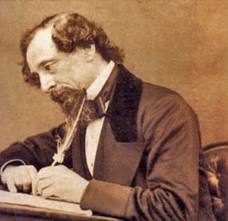“So, throughout life, our worst weaknesses and meannesses are usually committed for the sake of the people whom we most despise.” – Charles Dickens, Great Expectations
 “Charles John Huffam Dickens (7 February 1812 – 9 June 1870) was an English writer, generally considered to be the greatest novelist of the Victorian period and responsible for some of English literature’s most iconic novels and characters. During his lifetime Dickens’ works enjoyed unprecedented popularity and fame, and they remain popular today. It was in the twentieth century, however, that his literary genius was fully recognized by critics and scholars.
“Charles John Huffam Dickens (7 February 1812 – 9 June 1870) was an English writer, generally considered to be the greatest novelist of the Victorian period and responsible for some of English literature’s most iconic novels and characters. During his lifetime Dickens’ works enjoyed unprecedented popularity and fame, and they remain popular today. It was in the twentieth century, however, that his literary genius was fully recognized by critics and scholars.
Many of his works were originally published serially in monthly installments, a format of publication that Dickens himself helped popularise. Unlike other authors who completed novels before serialisation, Dickens often wrote the episodes as they were being serialised, and he often revised his plots and characters on the basis of readers’ responses to a published episode. The practice lent his stories a particular rhythm, employing cliff-hangers to keep the public looking forward to the next installment. The continuing popularity of his novels and short stories is such that they have never gone out of print.
Dickens’s work has been highly praised by writers such as Leo Tolstoy, George Orwell, and G. K. Chesterton for its realism, comedy, prose style, unique characterisations, and social criticism, though others, such as Henry James and Virginia Woolf, have criticised it as melodramatic, sentimental, and implausible.” (Wikipedia)
